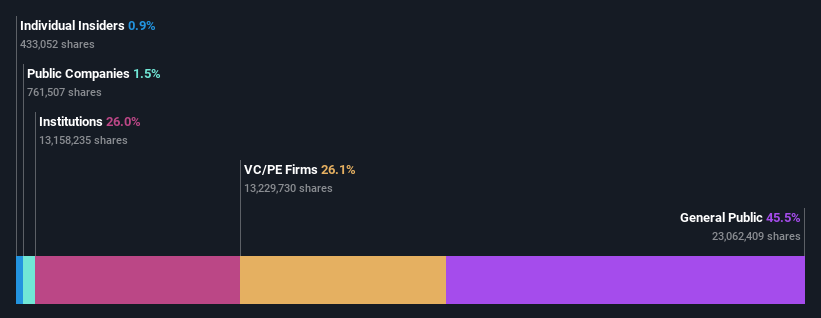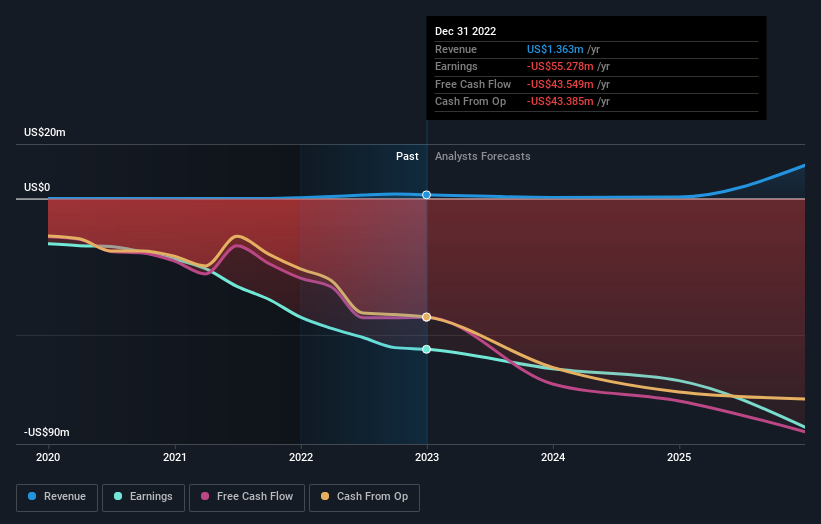Lyra Therapeutics, Inc.'s (NASDAQ:LYRA) biggest owners are retail investors who got richer after stock soared 18% last week
Key Insights
Lyra Therapeutics' significant retail investors ownership suggests that the key decisions are influenced by shareholders from the larger public
50% of the business is held by the top 13 shareholders
A look at the shareholders of Lyra Therapeutics, Inc. (NASDAQ:LYRA) can tell us which group is most powerful. And the group that holds the biggest piece of the pie are retail investors with 46% ownership. That is, the group stands to benefit the most if the stock rises (or lose the most if there is a downturn).
As a result, retail investors collectively scored the highest last week as the company hit US$122m market cap following a 18% gain in the stock.
Let's take a closer look to see what the different types of shareholders can tell us about Lyra Therapeutics.
View our latest analysis for Lyra Therapeutics
What Does The Institutional Ownership Tell Us About Lyra Therapeutics?
Institutions typically measure themselves against a benchmark when reporting to their own investors, so they often become more enthusiastic about a stock once it's included in a major index. We would expect most companies to have some institutions on the register, especially if they are growing.
We can see that Lyra Therapeutics does have institutional investors; and they hold a good portion of the company's stock. This can indicate that the company has a certain degree of credibility in the investment community. However, it is best to be wary of relying on the supposed validation that comes with institutional investors. They too, get it wrong sometimes. If multiple institutions change their view on a stock at the same time, you could see the share price drop fast. It's therefore worth looking at Lyra Therapeutics' earnings history below. Of course, the future is what really matters.
Lyra Therapeutics is not owned by hedge funds. Perceptive Advisors LLC is currently the company's largest shareholder with 18% of shares outstanding. North Bridge Venture Partners is the second largest shareholder owning 8.1% of common stock, and Nantahala Capital Management, LLC holds about 4.4% of the company stock.
After doing some more digging, we found that the top 13 have the combined ownership of 50% in the company, suggesting that no single shareholder has significant control over the company.
While studying institutional ownership for a company can add value to your research, it is also a good practice to research analyst recommendations to get a deeper understand of a stock's expected performance. Quite a few analysts cover the stock, so you could look into forecast growth quite easily.
Insider Ownership Of Lyra Therapeutics
The definition of an insider can differ slightly between different countries, but members of the board of directors always count. The company management answer to the board and the latter should represent the interests of shareholders. Notably, sometimes top-level managers are on the board themselves.
Insider ownership is positive when it signals leadership are thinking like the true owners of the company. However, high insider ownership can also give immense power to a small group within the company. This can be negative in some circumstances.
Our information suggests that Lyra Therapeutics, Inc. insiders own under 1% of the company. It appears that the board holds about US$1.0m worth of stock. This compares to a market capitalization of US$122m. Many investors in smaller companies prefer to see the board more heavily invested. You can click here to see if those insiders have been buying or selling.
General Public Ownership
The general public, who are usually individual investors, hold a 46% stake in Lyra Therapeutics. While this size of ownership may not be enough to sway a policy decision in their favour, they can still make a collective impact on company policies.
Private Equity Ownership
With a stake of 26%, private equity firms could influence the Lyra Therapeutics board. Some might like this, because private equity are sometimes activists who hold management accountable. But other times, private equity is selling out, having taking the company public.
Next Steps:
While it is well worth considering the different groups that own a company, there are other factors that are even more important. Take risks for example - Lyra Therapeutics has 4 warning signs (and 1 which is concerning) we think you should know about.
If you are like me, you may want to think about whether this company will grow or shrink. Luckily, you can check this free report showing analyst forecasts for its future.
NB: Figures in this article are calculated using data from the last twelve months, which refer to the 12-month period ending on the last date of the month the financial statement is dated. This may not be consistent with full year annual report figures.
Have feedback on this article? Concerned about the content? Get in touch with us directly. Alternatively, email editorial-team (at) simplywallst.com.
This article by Simply Wall St is general in nature. We provide commentary based on historical data and analyst forecasts only using an unbiased methodology and our articles are not intended to be financial advice. It does not constitute a recommendation to buy or sell any stock, and does not take account of your objectives, or your financial situation. We aim to bring you long-term focused analysis driven by fundamental data. Note that our analysis may not factor in the latest price-sensitive company announcements or qualitative material. Simply Wall St has no position in any stocks mentioned.
Join A Paid User Research Session
You’ll receive a US$30 Amazon Gift card for 1 hour of your time while helping us build better investing tools for the individual investors like yourself. Sign up here


